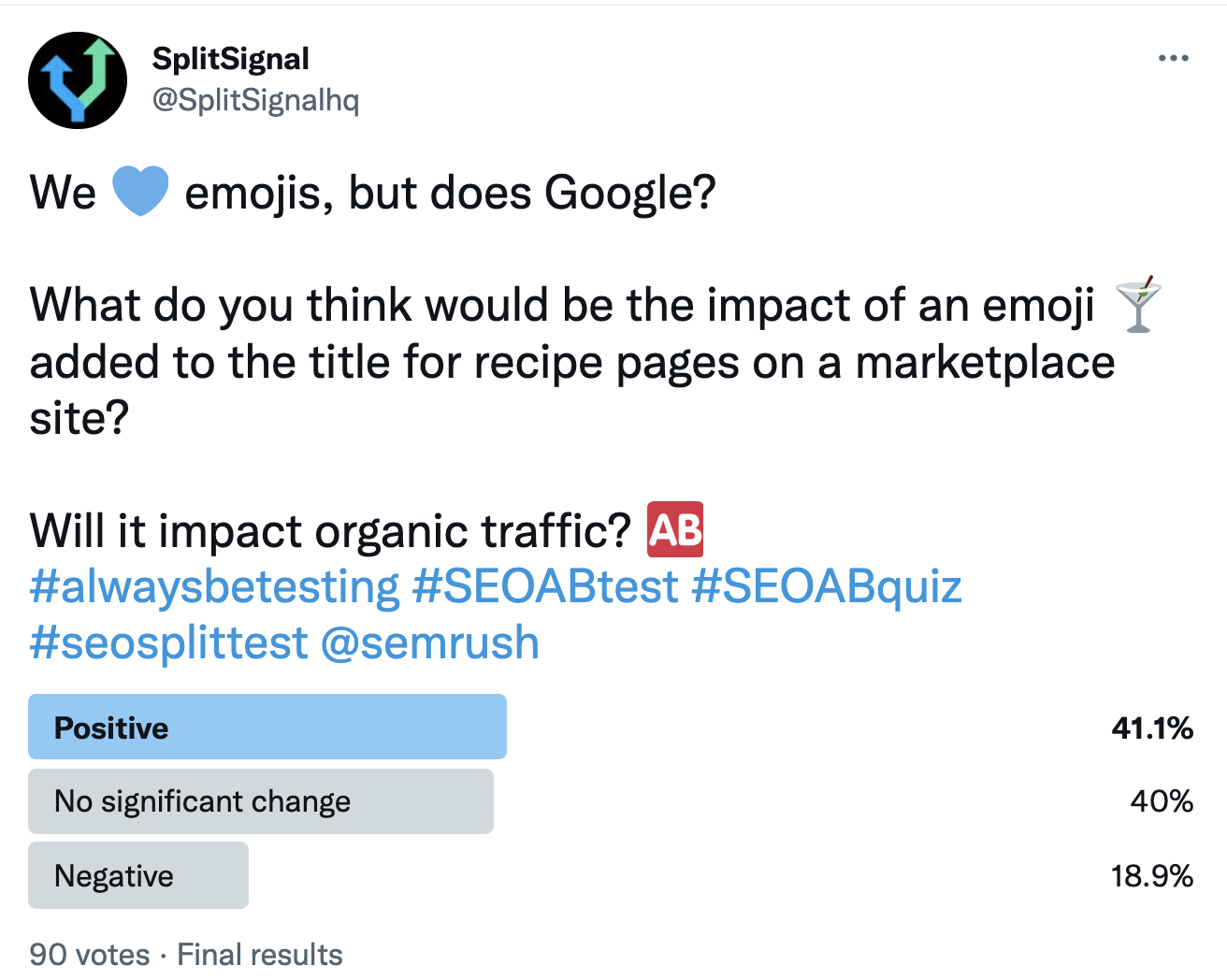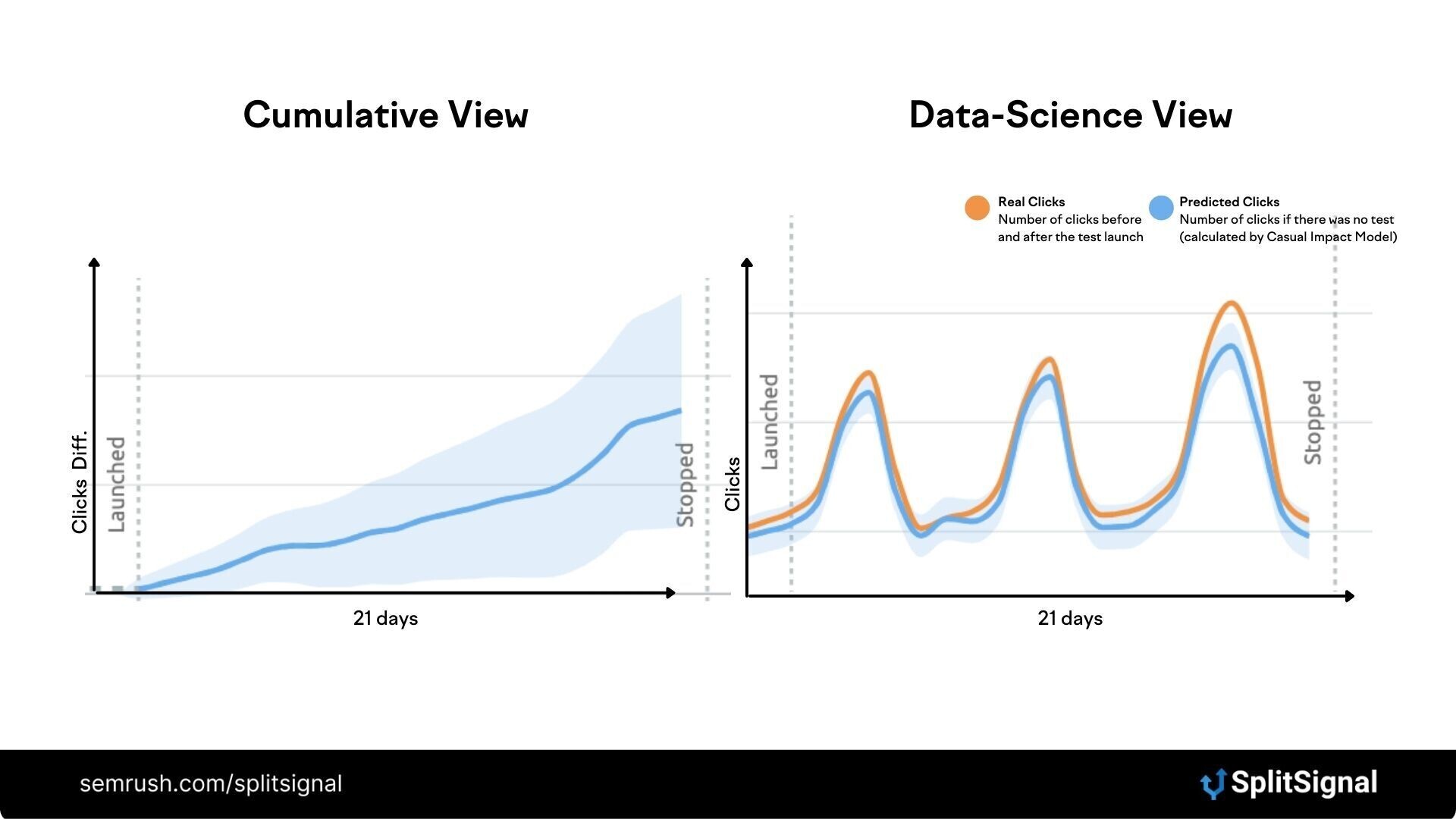Before you start: what do you know about SEO split-testing? If you're unfamiliar with the principles of statistical SEO split-testing and how SplitSignal works, we're suggesting you start here or request a demo of SplitSignal.
First, we asked our Twitter followers to vote how adding a cocktail emoji ð¸ to the title for recipe pages of a marketplace site would impact organic traffic.

41% of our followers guessed it right, the test result was positive.
Read the full case study to find out why.
The Case Study
An emoji says more than a thousand words, right? ð¤·
Placing emojis in the page title or meta description has sparked a lot of discussion within the SEO community. Many find the use of emojis spammy or unprofessional, while others use them as an attempt to make their search result snippet stand out and increase click-through rates, especially for domains targeting a younger audience. We wanted to put this to the test for a major online beverage retailer and let their target audience decide.
Before we move on to the case, let's take a look at what emojis actually are and how you can use them for SEO purposes. Emojis may look like icons or small images, but they are not. They are a sequence of characters from the UTF-8 character set, defined by the Unicode standard. Since emojis are characters, they can be used in HTML just like any other character. This means you can add emojis to elements like the title tag.
Google (and almost every other site) supports the UTF-8 character set and is, therefore, able to display emojis in their search results. In practice, however, not all emojis are guaranteed to appear in search results, so it is recommended to test the desired emoji first. You can use the Unicode references found in this table to display emojis in HTML. In order for the browser to understand that you are displaying an emoji, you must start the reference and end it with a semicolon.
Now, let’s dive into the case.
Hypothesis
For this test, a very clever SEO professional hypothesized that adding a cocktail-like emoji to the page title would have a positive effect on organic traffic to the website's beverage recipe pages.
The Test
The test involved a page title change and was ultimately run on a selected group of recipe pages. We were able to set up this test easily with SplitSignal. 486 recipe pages were selected as either a variant or control group. We added the cocktail-like emoji at the end of each variant group page title, just before the brand name
 Example of The Title on The Variant Group of Pages
Example of The Title on The Variant Group of PagesThe Results
We rolled out the test on June 15, and the test lasted 21 days.
 SplitSignal Interface: Variation Group Traffic
SplitSignal Interface: Variation Group TrafficIn the image above, you see a development/progress of the variant (orange line) compared to the forecasted control group (blue line). The forecast is based on historical data that we use to predict the expected traffic to the variant.
The lines start to diverge right away in the first week. This means that the traffic to the variant group is performing better than predicted and shows that the test is a success. Ultimately, based on organic sessions, we see an increase in organic traffic of no less than 11.3%.
We use a set of control pages to give the model context for trends and external influences. If something else changes during our test (e.g., seasonality), the model will detect and take it into account. The model thus recognizes that increasing search demand (influenced by the season) is not the result of our change but of external factors. By filtering these external factors, we gain insight into what the impact of an SEO change really is.
 Cumulative and Data-Science Views of the Test Result
Cumulative and Data-Science Views of the Test ResultThe graph above shows the cumulative effect of the increase in organic traffic compared to our control group. The shaded blue area represents a 95% confidence interval. When all three curves perform below (negative) or above (positive) the y=0 (cumulative gradient) axis, the test is statistically significant.
At the end of the test, we were 99% sure that the results were not caused by chance. Not bad, right? This means we can be 99% sure that the increase in traffic is a result of adding the cocktail-like emoji to the page title.
Why?
The page title change has achieved the expected/desired effect, namely, an increase in organic traffic. Based on all measured metrics, this test was positive and significant. Of course, we wanted to know exactly what happened during this test because an 11.3% increase is huge.
Ultimately, this was a user test. The success of adding emojis to a page title depends on the target audience. If they find it attractive, this can lead to a significant increase, as shown by this test. Looking at the data, we saw an immediate increase in clicks (CTR) to the variant pages, but we also saw an increase in impressions, which we didn't expect right away. So what happened?
Towards the end of the test, you can see that we really outperformed the control group. We saw that the positive effect on clicks seemed to pay off in better positioning and, therefore, more visibility. As our rankings improved, we got more impressions, resulting in even more clicks to our recipe pages.
Google once said that users are often the best judges of relevance, so if a user selects a particular search result, it is likely to be relevant, or at least more relevant than the alternatives presented. This is certainly true for this test, explaining the data and what happened during the test that led to the growth in organic sessions.
This case confirms that the page title is still a powerful SEO element. As mentioned, this is a test determined by users. We know from experience that the results of a similar test can differ per site, industry, target group, and country. Given the impact it can have, it's a good idea to test it before rolling it out on your site. In this case, we know for sure that enriching search results with emojis is definitely a good idea ð
 Have your next SEO split-test analyzed by OrangeValley Agency
Have your next SEO split-test analyzed by OrangeValley AgencyWould you test this on your website? There's an easy way to make instant, indexable, reversible title and description tag changes on even the most inflexible CMS. It's called PageImprove, and you can try it out for free here.
If you loved this case study, follow SplitSignal on Twitter, and never miss any new ones.
Innovative SEO services
SEO is a patience game; no secret there. We`ll work with you to develop a Search strategy focused on producing increased traffic rankings in as early as 3-months.
A proven Allinclusive. SEO services for measuring, executing, and optimizing for Search Engine success. We say what we do and do what we say.
Our company as Semrush Agency Partner has designed a search engine optimization service that is both ethical and result-driven. We use the latest tools, strategies, and trends to help you move up in the search engines for the right keywords to get noticed by the right audience.
Today, you can schedule a Discovery call with us about your company needs.
Source:





